“Rivers perhaps are the only physical features of the world that are at their best from the air. Mountain ranges, no longer seen in profile, dwarf to anthills; seas lose their horizons; lakes have no longer depth but look like bright pennies on the earth’s surface; forests become a thin impermanent film, a moss on the top of a wet stone, easily rubbed off. But rivers, which from the ground one usually sees only in cross sections, like a small sample of ribbon—rivers stretch out serenely ahead as far as the eye can reach. Rivers are seen in their true stature.”
– Anne Morrow Lindbergh, “North to the Orient”
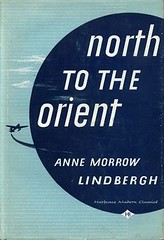 North to the Orient
North to the Orient
Anne Morrow Lindbergh
![]()
Whenever I read anything by or about Charles Lindbergh, I feel a personal connection. That, in turn, engenders a feeling of connection to Anne Morrow Lindbergh. It’s entirely illusory, this connection, but strong nonetheless: Lindbergh was an icon to me, still a heroic figure when I was a boy in the 1950s, quite possibly a major influence on my decision to become an aviator later in life. Anne was the beautiful woman who married this heroic figure, the most famous man in the world at the time, who went adventuring with him as copilot and radio operator, who suffered with him after the kidnapping and death of their first child, who stuck with him when his reputation bottomed out in the late 1930s and early 1940s, who became an environmentalist, who found her voice as a writer.
Yes, adults who had been around in the late 1930s and early 1940s knew Charles Lindbergh was a Nazi sympathizer, anti-semite, and racist. They wanted to keep their heroes, though, and didn’t allow any of that to be taught in schools. As far as children in the 1950s knew, Lindbergh was as a pure a hero as he was in 1927 when he flew from New York to Paris. I learned about the other stuff as an adult, along with revelations of bigamy: a secret wife and children in Germany, children by yet other women.
None of this lessened my admiration of Anne, or my desire to read something she’d written. Learning later still that Anne herself had feet of clay and had had more than one extramarital affair—not that a woman of her era would ever write about either her own husband’s or her own infidelities—made me want to read her even more. Even her own embrace of fascism during the heyday of Hitler, which damaged her reputation along with Charles’, did not dissuade me.
I chose “North to the Orient,” her first book, the memoir of a epic 1931 flight of exploration to map potential air routes across the roof of North America and westward to Russia, Japan, and China.
This is a fascinating, lyrically-written little book; an engrossing read, conveying—without unnecessary detail—what it was like to pioneer air routes that had never been flown before: the preparation, the equipment and survival gear so meticulously packed into compartments and pontoons, Anne’s experiences learning to send and receive Morse code from the cockpit and the constant reeling out and in of the long trailing antenna,, navigating by compass and landmarks below, harrowing descriptions of blind descents in fog.
Her descriptions of the places they visited, places only a handful of people had ever been to, are fascinating and well told: isolated trapping outposts and Eskimo villages, the Kamchatka Peninsula, remote Japanese islands, teeming China. Some of her casually-related details will jar modern sensibilities; in particular Anne’s acceptance of the cultural separation of European whites from everyone else as the natural order of things, so apparent in her descriptions of tiny Canadian and Alaskan settlements, where the few white inhabitants segregated themselves from indigenous inhabitants.
Anne was a shy woman who had been raised to efface herself; this is ever apparent in her writing. I now want to read her later diaries and letters (there are several collections of these in print) to see how she developed as a person once her husband’s heroism had faded, once she herself had experienced adversity and discontent, once she had become her own woman. I don’t know what I will find, but that’s part of the adventure.
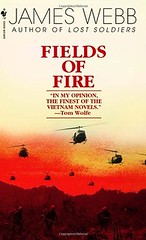 Fields of Fire
Fields of Fire
James Webb
![]()
I took my sweet time getting around to reading this famous Vietnam War novel: 38 years, in fact. Vietnam was huge in my life, though like many other young men of my generation I didn’t go. I had a deferment. I protested while other young men my age fought. I have always felt guilty about that. I think most of us—the draft dodgers, the lucky ones with deferments—came to feel that way, some sooner, some later. Over time, we came to admire those who answered what they felt to be the call of duty.
I use the word duty intentionally, because James Webb exemplifies it, both in his novel and his career in government and politics. I met the man in Washington DC in the 1980s. He was a deputy secretary of defense and I was an Air Force major sent to brief him on a readiness program my command was developing. He radiated duty. He was the kind of man words like principle and probity and rectitude were invented for. At the time I knew he had been a Marine officer in Vietnam and that he had been wounded there. I did not know about his novel, but when I got back to headquarters everyone told me about the book.
Huh. This review is turning out to be more about me than about the book. Funny how that happens when Vietnam, and having not served there, looms so large in one’s life.
“Fields of Fire” is as gritty and realistic as it gets, from shitting in catholes to ringworm and intestinal parasites to being pinned down by relentless machine gun fire from a tree line on the edge of a rice paddy. It’s hard today to read of gooks and VC and starving villagers, but that is how it was and Webb never flinched from it. It’s hard to read of fragging, but that was part of it too. It’s hard to read of young marines becoming so inured to war and to the Vietnamese they were nominally sent to assist that they would strip a dead girl naked just to see her pussy. But that too is how it was, and Webb includes it all. It is almost unbelievably intense; one fire fight after another, dead comrades left and right; but that too is how it was, and Webb captures it all.
Webb succumbs to preachiness in one final chapter, when the college boy Goodrich comes home—minus the leg he lost in a firefight that resulted from his own carelessness and which cost the lives of the best men in his platoon—and Goodrich’s father speaks for James Webb (I think), lecturing about duty, but this is a mere page in what is otherwise the most intense novel of ground warfare I have ever read.
This book. It’s like “The Call of the Wild,” a book that should be in every young man’s library. It’s the seminal novel of the Vietnam war. Shame on me for putting the experience off for so many years, and yes, experience is the word I meant to use. “Fields of Fire” is to be experienced, not merely read.
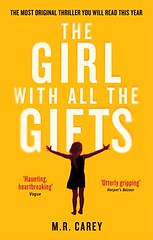 The Girl with All the Gifts
The Girl with All the Gifts
M.R. Carey
![]()
I used to love a good zombie movie, but a zombie book? After wading through “World War Z” a few years ago I thought I’d paid my dues. Zombie stories are best told in movie format, nice and short. The stories are so simple, after all … you don’t need more than an hour and a half to satisfy your zombie hunger, and you certainly don’t need to spend days reading a 450-page novel about the poor creatures.
But then Hollywood cashed in on George Romero’s originality, and the zombie movie genre became diluted with hundreds of knockoffs. Buried in that pile of cinematic crap, however, two British films stood out: “28 Days Later” and “28 Weeks Later.”
I don’t know if there’s any intentional connection between those movies and M.R. Carey’s novel, but “The Girl with All the Gifts” goes deep into the 28 Days/28 Weeks universe, deeper than I expected, and is a marvelous read: exciting, fascinating, satisfying. Of course it’s all bullshit, this zombie stuff, but what great bullshit this novel is!
By which I mean I was wholly taken in; I entered M.R. Carey’s universe and engaged with the characters and the situations they found themselves in as if they were real. The only time I was tempted to say “Oh, come on!” was when the intrepid band of humans (and one zombie) find the safe haven of an unmolested armored research vehicle in the heart of an abandoned and looted London, but I forgave the author that small deus ex machina.
This is a hell of a good read. A beach book among beach books, the zombie novel.
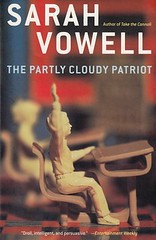 The Partly Cloudy Patriot
The Partly Cloudy Patriot
Sarah Vowell
![]()
“The Partly Cloudy Patriot” is a collection of magazine pieces, radio readings, and original essays (the title piece, for example), similar to Sarah Vowell’s earlier collection “Take the Cannoli.” There is no unifying theme, as with later books like “Lafayette in the Somewhat United States,” “Unfamiliar Fishes,” “The Wordy Shipmates,” and “Assassination Vacation.”
Unless, that is, you enjoy reading anything Sarah Vowell writes, as I do, in which case the theme is Sarah Vowell herself: her worldview, her likes and dislikes, her life, her family. Here’s part of the review I wrote after reading “Take the Cannoli”:
“Sarah is a great observer of people, places, moods, trends, culture, and society at large. She is also a disarmingly frank observer of herself. I always feel, after reading Sarah Vowell, as if I’ve just had a long conversation with an unusually open and honest friend.”
I have yet to read Sarah’s first book, “Radio On: a Listener’s Diary.” That’s next, and then I’ll have to wait till she writes something new. It won’t be easy.
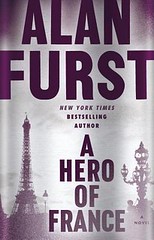 A Hero of France (Night Soldiers #14)
A Hero of France (Night Soldiers #14)
Alan Furst
![]()
I started noticing the change in Alan Furst’s writing two novels ago. This is from my review of “Mission to Paris” (Night Soldiers # 12):
“Furst’s latest, ‘Mission to Paris,’ seems different from earlier novels in his Night Soldiers series. It is not as atmospheric, not as noir. Furst’s omniscient narrator is more omniscient than normal: one feels Furst explains more than is strictly necessary.”
I’m not nearly as down on Furst’s new style as other fans. Here are some detailed objections listed by another reviewer:
- All nuance has been obliterated in favor of simplistic moralizing and reeking explicitness
- Lyrical, well composed prose has given way to a direct, factual-reporting style
- Sex and nudity have been shoved in for purposes of titillation only, in ways that add nothing to the plot or characterizations
- The realistic gritty-noir moody tone has been replaced by that of a commercial, superficial action-thriller
These comments are spot on, unfortunately. The last three Night Soldiers novels read less like novels than outlines of novels, with characterization, world-building, and nuance yet to be added.
Mind you, a hell of a great Alan Furst novel could be built upon the tale he tells in “A Hero of France.” The story is gripping, almost certainly based upon fact: actual wartime activities and accomplishments of what were most likely several resistance fighters, rolled together and attributed to the fictional Mathieu and his accomplices.
This tale, though, is told in documentary style by an omniscient narrator, and because characterization is absent, along with the feel of occupied Paris (so very much present in earlier Furst novels), so too is tension and suspense. Overall, a disappointment.
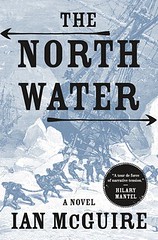 The North Water
The North Water
Ian McGuire
![]()
I won’t say much about “The North Water” because there isn’t much to say, nor does there seem to be a point to the novel. It’s the tale a doomed whaling voyage, filled with doomed characters, some of them evil, and the evil that results from evil. Maybe that’s the point. It struck me, though, that the point was simply to be grim.
You know you’re in for gothic nastiness when you start to encounter words like fetor and incohate. Mr. McGuire deploys these words in lavish fashion to describe cold blooded murders, bouts of vomiting, spurts of diarrhea, gouts of blood. Oh, did I mention ichor? There’s lots of that as well. Along the way are drownings, clubbed seals, gruesome injuries, a captain’s plan to sink his ship and kill his crew for a little insurance money, and an ill-used Irish surgeon’s revenge.
All very grim, as I mentioned. Yes, it’s a page-turner, but other than that I got nothing out of it. How the publisher managed to get a book-cover blurb from the sainted Hilary Mantel I cannot imagine.